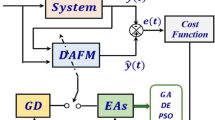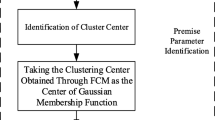Abstract
This paper presents a new kind of Evolutionary Fuzzy System (EFS) based on the Least Squares (LS) method and a hybrid learning algorithm: Adaptive Evolutionary-programming and Particle-swarm-optimization (AEPPSO). The structure of the Extended Fuzzy Basis Function Network (EFBFN) is firstly proposed, and the LS method is used to design it with presetting the widths of the hidden units in EFBFN. Then, to enhance the performance of the obtained EFBFN ulteriorly, a novel learning algorithm based on least squares and the hybrid of evolutionary programming and particle swarm optimization (AEPPSO) is proposed, in which we use EPPSO to tune the parameters of the premise part in EFBFN, and the LS algorithm to decide the consequent parameters in it simultaneously. In the simulation part, the proposed method is employed to predict a chaotic time series. Comparisons with some typical fuzzy modeling methods and artificial neural networks are presented and discussed.
Preview
Unable to display preview. Download preview PDF.
Similar content being viewed by others
References
Wang, L.X., Mendel, J.M.: Fuzzy Basis Functions, Universal Approximation, and Orthogonal-Least Squares Learning. IEEE Trans. Neural Networks. 3, 807–814 (1992)
Chen, S., Cowan, C.F.N., Grant, P.M.: Orthogonal Least Squares Learning Algorithm for Radial Basis Function Networks. IEEE Trans. Neural Networks. 2, 302–309 (1991)
Lee, C.W., Shin, Y.C.: Construction of Fuzzy Systems Using Least-Squares Method and Genetic Algorithms. Fuzzy Sets and Systems 137, 297–323 (2003)
Takagi, T., Sugeno, M.: Fuzzy Identification of Systems and Its Application. IEEE Trans. Systems, Man, and Cybernetics. 15, 116–132 (1985)
Shi, Y., Eberhart, R.C.: Parameter Selection in Particle Swarm Optimization. In: The 7th Annual Conference on Evolutionary Programming, San Diego, USA, vol. 7, pp. 591–600 (1998)
Hwang, H.S.: Automatic Design of Fuzzy Rule Bases for Modeling and Control Using Evolutionary Programming. IEE Proc. Control Theory Appl. 146, 9–16 (1999)
Fogel, D.B.: Evolutionary Computations: Toward a New Philosophy of Machine Intelligence. IEEE, New York (1995)
Crowder, R.S.: Predicting The Mackey-Glass Time Series With Cascade-correlation Learning. In: Proc. 1990 Connectionist Models Summer School: Carngie Mellon University, pp. 117–123 (1990)
Jang, J.S.R., Sun, C.T., Mizutani, E.: ANFIS: Adaptive-Network-Based Fuzzy Inference System. IEEE Trans. Systems., Man and Cybernetics. 23, 665–685 (1993)
Ye, B., Guo, C.X., Cao, Y.J.: Identification of fuzzy model using evolutionary programming and least squares estimate. In: Proc. 2004 IEEE Fuzzy Systems Conf., vol. 2, pp. 593–598 (2004)
Author information
Authors and Affiliations
Editor information
Editors and Affiliations
Rights and permissions
Copyright information
© 2005 Springer-Verlag Berlin Heidelberg
About this paper
Cite this paper
Ye, B., Zhu, C., Guo, C., Cao, Y. (2005). Generating Extended Fuzzy Basis Function Networks Using Hybrid Algorithm. In: Wang, L., Jin, Y. (eds) Fuzzy Systems and Knowledge Discovery. FSKD 2005. Lecture Notes in Computer Science(), vol 3613. Springer, Berlin, Heidelberg. https://doi.org/10.1007/11539506_10
Download citation
DOI: https://doi.org/10.1007/11539506_10
Publisher Name: Springer, Berlin, Heidelberg
Print ISBN: 978-3-540-28312-6
Online ISBN: 978-3-540-31830-9
eBook Packages: Computer ScienceComputer Science (R0)




